The Cocoa Research Institute of Nigeria (CRIN), in partnership with the Federal Ministry of Agriculture and Rural Development (FMARD), has distributed more than 300,000 hybrid cocoa seedlings in the current farm season. This is in addition to the establishment of a modern fermentary at its headquarter in Ibadan. The Executive Director (ED) of the premiere Institute, Dr. Patrick Adebola, who made these known in a brief chat with The News, added that no fewer than 13 main cocoa producing states benefited from the policy. The Plant Breeder/Geneticist expressed hope of meeting the half a million-mark annual distribution target, to accelerate cocoa production in the country.
Dr. Adebola, who was appointed ED towards the end of 2020, commended staff and board of the Institute under the chairmanship of Alhaji Abdullahi Jao, for the industrial harmony and level of growth it currently enjoys. He noted that his ultimate agenda is the transformation of CRIN to a one stop shop on the nation’s agriculture sector.
Speaking further the ED said his efforts are centred on human capital development as a means to helping the Institute realise its core research mandate. He pointed at improved power supply, 24-hour internet connectivity, establishment of an ultramodern Cocoa Flavour Laboratory and restoration of training programs as indications of institutional growth.
“We are doing our best to instill the culture of research, redeem the Institute’s battered image and get it back on its core mandate. With that, we are now looking at ways to increase the Internally Generated Revenue (IGR) of the Institute, so that we can reduce the funding gap which has been affecting our operations.
“CRIN is now fully back on track on its core mandate of research and development on the five mandate crops of Cocoa, Cashew, Coffee, Kola and Tea. Improved varieties of seedlings are being mass produced and distributed to farmers to boost production and improve the quality of their produce. Regular training of farmers and other stakeholders on Good Agricultural Practices (GAP) are also being carried out in effort to increase productivity and boost the income of farmers.”


